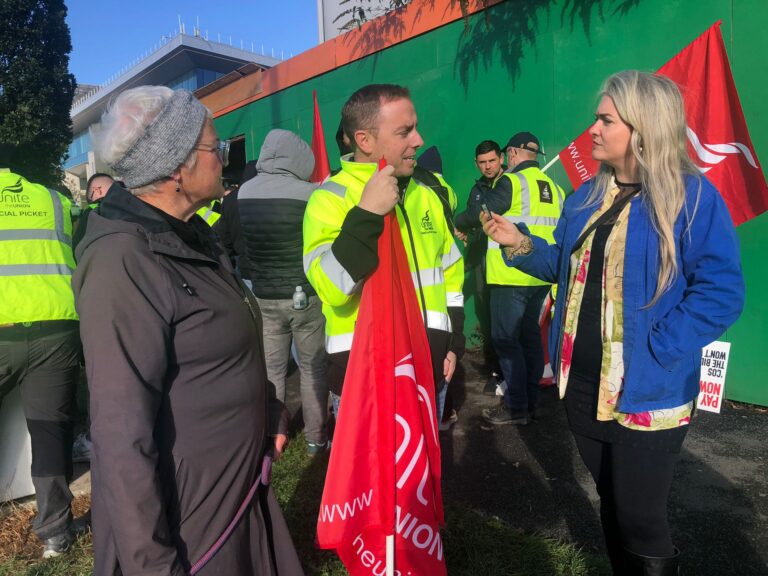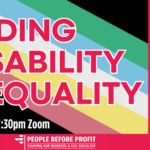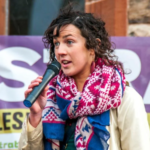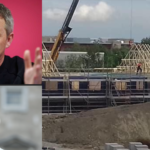Unite’s Mechanical Workers picketed the National Children’s Hospital today. They want the restoration of the first hour of Travel Time, a part of their pay as workers who travel to sites to work since the 1960s, but taken off them after the 2008 Crash.
Mechanical workers include plumbers, fitters, welders and apprentices. Those on strike are all members of Unite the union’s Construction Branch. Connect and SIPTU have not joined in this campaign but their members engaged in the same work will benefit when MEBSCA (Mechanical Engineering and Building Services Contractors’ Association) comes to the table to put Travel Time back on the SEO
FOUR FRIDAYS FOR TRAVEL TIME
Unite’s red flags have been up for every Friday in September in front of MEBSCA affiliate sites. MEBSCA is the employers’ side umbrella group which includes bigger names like Jones Engineering, Mercury Engineering and smaller outfits like CJK.
Unite had simultaneous pickets the last three Fridays. They were on large building or maintenance sites across the country: Pfizer in Ringaskiddy, Cork; various Dublin locations, most notably Guinness where Jones Engineering has had a contract for decades; the massive Pfizer and Intel sites in Kildare; Eli Lilly, Analog and the ESB in Limerick, but though work stoppages continued, demonstration locations today were reduced to just the scandal ridden site of the National Children’s Hospital. And the union says talks look near.

THE PRESSURE IS ON
MEBSCA has indicated they are willing to talk if the Connect Union will join them. One of the reasons for this development is the pressure Unite has brought to bear through the OECD which obliges their member states like, the US and Ireland, to participate with trade unions. Jones Engineering did opposite, apparently, by naming just three individual shop stewards to the courts when looking for an injunction.
That action would expose those union members to pressure. That might be seen as an anti-union action. Jones could have named all the Unite members but instead they singled them out and that really looks like the opposite of partipating with the union and could put them on the outs with OECD’s rules, possibly endangering the company’s ability to get contracts with the OECD linked states, like the US and Ireland.
A similar tactic backfired badly on MIL, the Irish subsidiary of Murphy, when Unite pushed back very successfully through the courts in the famous Murphy 4 campaign victory. Pressuring the union is not always the best way to deal with workers’ real demands.

WHO’S LOSING AND WHO’S WINNING
MEBSCA continues to report to the press that Unite’s strike is bad for the industry. But lowering pay is bad for the workers that’s why 90% voted for action on Travel Time, currently outside the Sectoral Employment Order’s terms.
Also outside it are Ireland’s soaring rents, mortgage rates, and prices at the tills and the pumps workers have to use to get to and from worksites daily. Prices and housing costs aren’t coming down- so somehow it is income that must go up, not just the owners’ now record profits.
Local area Cllr Hazel De Nortúin visited the picket with Bríd Smith one of the area’s TDs. After talking with the members and officials she said: ‘When Unite gets MEBSCA to the table, it will be a victory for the strike, for all of Unite, and for the workers across this industry- especially those who are willing to fight. Fair play to each and every one of them who’ve been out. They are showing exactly what everyone of us can do. Unite and fight. Get behind them.’













